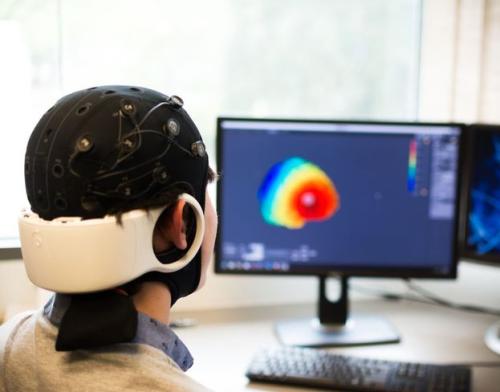Our research focuses on characterizing the psychological processes that support human memory, and their neural underpinnings. In particular, we have investigated the functions of brain regions in the prefrontal cortex, and medial temporal lobes. Some of our research has addressed the following questions:
- How do we keep information "in mind" at a given time?
- How are these processes related to processes that support formation and retrieval of memories for past events?
- How do we "bind" together all of the aspects of an event into a coherent memory representation?
- How do we use our goals and knowledge to facilitate formation of new memories and retrieval of memories of past events?
- Are there fundamental differences between the neural mechanisms that support feelings of familiarity and those that support recollection of details about past events?
- What are the neural mechanisms that underlie memory disorders in patients with schizophrenia?
We use a number of research methods to address these questions, including functional magnetic resonance imaging (FMRI), field potentials recorded directly from the human brain, scalp-recorded electroencephalography (EEG) and event-related potentials, eye-tracking, and testing of patients with focal brain damage.

Current Projects
NSF Cognitive Neuroscience Program, Award 2122550
PI James Antony (CAL POLY), Co-Investigators Charan Ranganath and Maya Geva-Sagiv
June 2023 - May 2026
Testing a Unified Spectral Temporal Context Model
How do we recall significant life-changing events such as our graduation from high school, or our wedding day, or even ordinary, daily events such as where we parked our car this morning? This research probes how the amount of elapsed time between the occurrence of the event and our recollection of that event affects myriad aspects of our memory. How long ago the event occurred affects multiple aspects of memory function, such as the quality and availability of the memory or whether other memories interfere with the memory of the event we are trying to recall. In this project we combine theoretical modeling, behavioral experiments and intracranial recordings from Epilepsy patients in UC Davis medical center to reach a unified model that accounts for the many effects of time in shaping our memories.
MULTI-UNIVERSITY RESEARCH INITIATIVE (OFFICE OF NAVAL RESEARCH)
PI Charan Ranganath
August 01, 2017 - July 30, 2022
A Computational Cognitive Neuroscience Approach to Understanding Event Representation and Episodic Memory
This program grant aims to develop a computational framework to explain how interactions between the hippocampus, ventromedial prefrontal cortex, and posterior medial network support event representation and episodic memory. We will accomplish the following Tasks: (1) Develop a computational model of event representation and episodic memory. (S. Gershman, Harvard), (2) Specify the neural mechanisms that support learning and application of semantic knowledge about events. (K. Norman, U. Hasson, Princeton), (3) Specify how cortico-hippocampal interactions support episodic memory retrieval and consolidation. (C. Ranganath, UC Davis), (4) Specify the cognitive and neural causes and consequences of event segmentation (J. Zacks, Washington University), & (5) Determine how broadband and oscillatory neural activity contributes to event segmentation and episodic memory (Orrin Devinsky & Lucia Melloni, NYU, in collaboration with all team members).
PI Kimberly McAllister, Program Co-Director Charan Ranganath
July 1, 2017 - June 30, 2022
Learning, Memory, and Plasticity (LaMP) Training Program
This proposal outlines a multi-disciplinary graduate training program in the neuroscience of learning and memory. This novel program cuts across disciplines to bridge the gaps between research at the cognitive, systems, and cellular/molecular levels. The program aims to train a new generation of innovative scientists who are capable of thinking about memory across scales and levels of analysis. The program includes specialized training in basic science, as well as translational studies of psychiatric and neurological disorders that affect memory.
PI Andy Yonelinas, Co-Investigator Charan Ranganath
September 1, 2014 - September 1, 2021
Plasticity, Perception, and the Medial Temporal Lobes
The proposal aims to determine how regions within the MTL contribute to complex scene perception and visual working memory using a combination of studies examining patients with focal lesions to specific MTL subregions, high-resolution functional magnetic resonance imaging (fMRI), and model- based analyses of results obtained with novel psychophysical paradigms.
Role: Co-Investigator
PI Charan Ranganath
July 01, 2018 – June 30, 2019
Naturalistic Memory and Neurocognitive Aging
This grant provides funding for a proof-of-concept study to examine memory for naturalistic stimuli (movies and stories) in healthy aging and preclinical AD.
PI Charan Ranganath, PI Daniel Ragland
December 01, 2014 – November 30, 2019
Neural Mechanisms of Memory Dysfunction in Schizophrenia
The goal of this proposal is to use multimodal imaging including magnetic resonance spectroscopy (MRS), electroencephalography (EEG) and functional magnetic resonance imaging (fMRI) to determine the causes of memory deficits in schizophrenia.